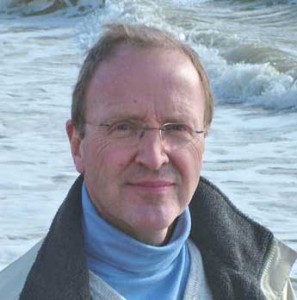On the ‘Impact of the Spiritual Journey on his Close Relationships’
 From a worldly perspective, it can be rather scary if a close friend or relative “finds God”. We fear alienation, exclusion, cold detachment. We sense that the power of the experience may carry the person away from us. It doesn’t have to be like that, however.
From a worldly perspective, it can be rather scary if a close friend or relative “finds God”. We fear alienation, exclusion, cold detachment. We sense that the power of the experience may carry the person away from us. It doesn’t have to be like that, however.
Even as a 14-year-old boy, I felt slightly threatened when my 16-year-old sister became a committed Christian, and suddenly found joy in scripture readings that to me were old-fashioned and meaningless. I remember coping with the change by making fun of it, though I was also secretly respectful and perhaps a little jealous of her new-found love. In fact, it was to become a life-long source of strength and happiness. She married an equally committed Christian and they brought up their children in the same faith tradition.
Nearly 25 years after that childhood episode, my own life suddenly took a fresh course. The catalyst was a vision: a golden-red light that opened out like a flower from the centre of my forehead. It happened during a few minutes of silence, following a chant by devotees of an Indian swami. He and a leading Anglican churchman had been taking part in a press conference in London, speaking about the soul. I was working at the time as medical and science correspondent of a leading UK newspaper, and a doctor friend had invited me. The conversation seemed to trigger some deep memory inside me.
It was a wake-up call, and a few months later I found myself regularly visiting a community of spiritual aspirants practising Raja Yoga, a form of meditation and understanding taught by the Brahma Kumaris.
My heart would sing with joy when I joined BK gatherings in London. There was a feeling of coming home, of some huge vacuum in my life being filled.
Yet I was married, with sons aged 12 and 13. I deeply loved my wife, Liz, and I enjoyed family life. How was I going to be able to pursue this new love, without losing the old?
I remember thinking “this is an impossible love”, even though no other human being was involved. I was at the beginning of a journey that was to contain much struggle, as well as joy.
Today, more than 30 years have passed since that visionary experience. The impossible has become possible – but at a price.
My marriage lasted a further seven years. This was just enough to allow our sons Tom and Will to reach adulthood, although I remember that the separation came as an unpleasant shock to Will, the younger boy.
It did to me, too. I felt bereft for several years, living alone in central London, whilst continuing with my journalistic work as well as my spiritual study.
I greatly valued family life and did not want us to part. The impetus for us to do so came from Liz. We had met at 18 and married young, and she had felt for some while that she would like to experience life as a single woman.
The ascetic lifestyle I had embraced as a part of my spiritual journey – celibate, teetotal, and a strict vegetarian diet that made eating out very difficult – had also made it increasingly difficult for us to continue together.
I was not acknowledging this at the time and Liz was kind enough not to cite it as the reason for our parting, as she must have guessed it would break my heart.
In fact, she and the boys all showed much tolerance and good humour over the years of my struggle.
At first, my way of trying to resolve the “impossibility” of pursuing my spiritual love in the family context was to attempt to bring the family with me on the journey. The trouble was, my motive was at least partly selfish, and those efforts proved counterproductive. I kept hoping against hope that the others would see the wisdom and value of the teachings, but they did not have the same need for them as me.
The core idea in Raja Yoga is that through long exposure to the physical world, we have tended to lose sight of our spiritual essence and suffering has grown as a result. To free the spirit and uplift our character, we need to restore the realization that we are eternal souls, whose true nature is of peace and love; and that we originate from God, the Supreme Soul, in a dimension beyond this material world.
The philosophy holds that when spiritual self-awareness is restored through loving remembrance of the Supreme, the world itself will be renewed. It just takes a change of consciousness.
To experience that divine connection, however, we have to loosen the hold of our present-day consciousness, which is almost always physically based. To know yourself as a soul, you have to stop thinking of yourself as a body.
Hence the celibacy, since the sex drive has become so strongly associated with sensual gratification. But it goes a lot further than that. The goal is gradually to let go of all the different “ego” identities we hold, such as male or female, husband or wife, grandpa or grandma; and even the sense of belonging that may come from identifying with your race, religion, nationality, profession, or occupation.
It isn’t that there is anything wrong with these as such. It is just that when we identify with them to the exclusion of the deeper self-awareness, they get in the way of our humanity, rather than strengthen it.
Our negative tendencies – fear, anger, greed, selfishness etc – mostly stem from the pain of threatened or actual loss. By identifying with our spiritual essence, we are able to attune ourselves to the unlimited love and peace of God. When we get this right, our sense of who we are shifts from the temporary and limited to the eternal and unlimited, and our fullness of heart is restored.
Then, the love that is our spiritual inheritance will enter our everyday lives. We will still take care of the body, and our roles, relationships, and affiliations, but from a position of strength rather than dependency; giving rather than taking.
That is the theory. As many who embark on this deep spiritual journey discover, it can be a tough call. There is a chicken-and-egg element to it. To learn to love truly, we have to stop loving conventionally. To learn to live truly, we have to die to our body-conscious ways, as Jesus taught:
“Do not think that I came to bring peace on the earth; I did not come to bring peace, but a sword. For I came to set a man against his father, and a daughter against her mother, and a daughter-in-law against her mother-in-law; and a man’s enemies will be the members of his household. He who loves father or mother more than Me is not worthy of Me; and he who loves son or daughter more than Me is not worthy of Me. And he who does not take his cross and follow after Me is not worthy of Me. He who has found his life shall lose it, and he who has lost his life for My sake shall find it.” (Matthew 10:34-39, New American Standard Bible)
Some couples do undertake the journey of transformation together, without separating. That is their good fortune. But I can see now that in my desperation to avoid losing my family life, I was trying to have my cake and eat it. This was a kind of dishonesty.
I now count myself extremely lucky that Liz forced the issue by insisting on the divorce, and yet at the same time remained a friend. It meant that eventually, I would learn to be able to love her in a different way. We still have a special relationship but it is free of dependency or desire. She wrote about it recently in the London Daily Mail: “The Husband I Love Left Me for the Man Upstairs” by Liz Hodgkinson
Even during the last seven years in which we were still together as a family, considerable benefit started to come through. I remember feeling that the children were more real to me as people than they had been during the earlier part of the marriage.
Rather than continuing to think of them as “our” sons – in a sense, as extensions of ourselves – I became more aware of them as individuals, with their own unique needs. This led to some decisions over schooling which brought particularly far-reaching benefits. I was also much more permissive than many fathers, and laid back about their adolescent experimentations. This was risky, but in my view they came through as wonderful people.
Because of the marriage ending, I suffered from a lack of contact with Tom and Will during their twenties. After a few years living on my own, I left London – and my newspaper career of more than 30 years – to help with life at a newly opened retreat centre near Oxford. Later, I was happy to be able to see more of my sons and their families after they married and had children of their own. I found that the more I let go of my old “family man” identity, the easier it became to love the children and grandchildren freely, without any conflict arising with my spiritual aspirations.
In the early days of the Brahma Kumaris in India, they were often accused of breaking up families. The advocacy of celibacy, as part of the endeavour to achieve soul- and God-realisation, outraged the “family values” of the community from which they came.
Today, there is still unease about this aspect of the teachings, but the enormous benefits that have sprung from 75 years of their work are nationally recognised. I too have gained enormously from my 30-year association with the BKs. Although Liz, Tom and Will all paid a price in terms of the disruption in our lives brought by my sometimes clumsily pursued love for “the man upstairs”, I hope it has been and will continue to be outweighed by the benefits I see accruing in all our lives.

Comments (1)
Links to this Post